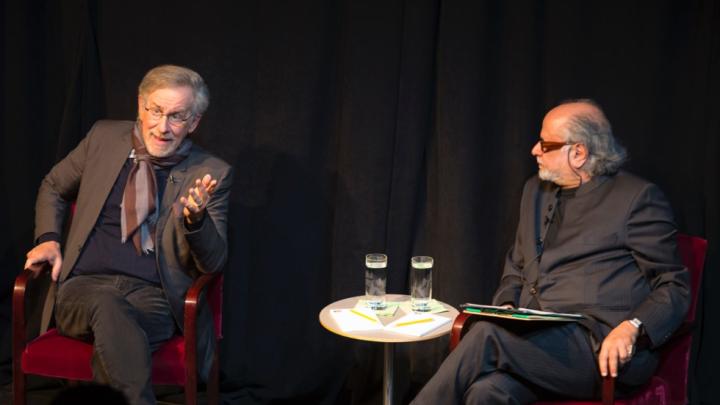As a child, Steven Spielberg loved toy trains—specifically, crashing them together—and this obsession was what first brought him to film. After one too many instances of broken trains, his father threatened to take the toys away, so the young Spielberg took his father’s 8mm Kodak movie camera, set up the trains, and smashed the cars into each other, hard. “I never crashed my trains again, but I watched that crash over, and over, and over again,” he recalled. “It sated me, enough. And that was the first movie I ever made.”
For the third annual Rita E. Hauser Forum for the Arts on Tuesday, sponsored by the Mahindra Humanities Center, the filmmaker spoke about themes of childhood and family in a conversation with Rothenberg professor of humanities Homi Bhabha that covered his lengthy career. Childhood, he told a packed crowd in the Loeb Drama Center, “is a wonderful period of time that I still have a very, very strong connection to. That’s why a lot of my films do tell stories through that unfiltered, genuine innocence of childhood.”
Clips Bhabha screened from early films like Duel and Jaws, said Spielberg, reflected his childhood fascination with destruction, but the 1982 hit E.T. the Extra-Terrestrial “was the first truly personal movie I made.” He had been writing a story about his parents’ divorce during the filming of Close Encounters of the Third Kind when he had the idea of an alien getting lost on earth. (Aliens and outer space were another childhood obsession, he said: his father even made him a small reflecting telescope.) “If you could learn to love something that looks like [E.T.], that opens your empathic pathways in all directions, including healing and repairing,” he said. “That’s because E.T. is a story of repair.”
Childhood also provided the inspiration for historical films like Schindler’s List, Saving Private Ryan, Munich, and Lincoln, he continued. His lifelong love of history began when he heard stories from his father’s fellow World War II veterans. “It was the first time in my entire life I ever saw my dad and about seven or eight other men sobbing in my living room,” he recalled. “When you’re a little kid, and you see your father, and you see your father’s adult friends, crying, it’s traumatic. It’s absolutely frightening.” Since then, his films have frequently explored questions of freedom, sacrifice, and morality. “This is…about core values,” Spielberg said. “These are the things that my dad and my mom taught me about.”
Technology has radically changed how movies are produced and consumed, he acknowledged, but he expressed confidence that the ideal of cinema would endure. “I think movies, in some form or another, as a public communion, will never end,” he said. “We’re a society that needs company, and I think we’re desperate for company, and we’re desperate for affirmation. When we go to a movie and people laugh, maybe we didn’t get the joke, but it pulls us into the joke. We need to be in a family of strangers, watching anything that’s going to change our lives in some way, or give us a new form of meaning.”







